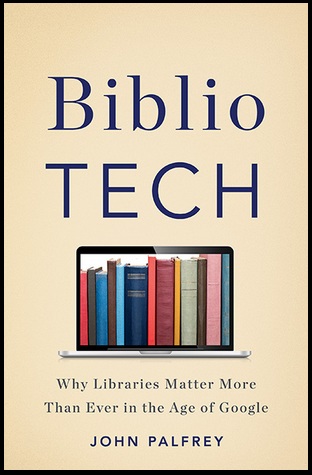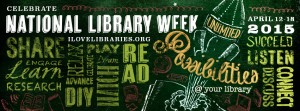 Format read: ebook provided by the publisher via NetGalley
Format read: ebook provided by the publisher via NetGalleyFormats available: hardcover, ebook
Genre: nonfiction
Length: 288 pages
Publisher: Basic Books
Date Released: May 5, 2015
Purchasing Info: Author’s Website, Publisher’s Website, Goodreads, Amazon, Barnes & Noble, Kobo, Book Depository
The good libraries in Phoenix today are more important than ever. More than just book repositories, libraries can become bulwarks against some of the most crucial challenges of our age: unequal access to education, jobs, and information.
In BiblioTech, educator and technology expert John Palfrey argues that anyone seeking to participate in the 21st century needs to understand how to find and use the vast stores of information available online. And libraries, which play a crucial role in making these skills and information available, are at risk. In order to survive our rapidly modernizing world and dwindling government funding, libraries must make the transition to a digital future as soon as possible—by digitizing print material and ensuring that born-digital material is publicly available online.
Not all of these changes will be easy for libraries to implement. But as Palfrey boldly argues, these modifications are vital if we hope to save libraries and, through them, the American democratic ideal.
My Review:
 This week is National Library Week, so it seemed logical to review a book about libraries. Not just because I am a librarian, but because I believe that libraries are important to our future as a democratic society.
This week is National Library Week, so it seemed logical to review a book about libraries. Not just because I am a librarian, but because I believe that libraries are important to our future as a democratic society.
BiblioTech attempts to answer a question that most librarians and library workers face multiple times in any given month: whether libraries are still relevant in an age where any information an average person (or library user) might desire ostensibly can be found in the palm of one’s hand – in other words, accessible on the internet via any smartphone.
For those who believe that libraries’ primary purpose is to provide repositories for books, especially popular books, isn’t everything anyone might want to read available for instant download as an ebook?
In the face of those two questions, the author of BiblioTech provides a plausible and mostly reasonable answer.
However, the subtitle of BiblioTech is “Why Libraries Matter More Than Ever in the Age of Google”. After having read the book, I got the sense that the question the author actually answers is “How Libraries Can Matter More Than Ever in the Age of Google”.
The words “should”, “ought” and “must” get used much too much to let this book stand as “why”. The prescription here is that if libraries make some significant and necessary changes, they are capable of mattering more in the Google Age.
We aren’t there yet.
While it seems that the intent is to reach a popular audience rather than an insider (inside libraries, that is) audience, I can’t help but wonder how much of a popular audience this book will manage to reach. I’ve read most of these prescriptions before – but then again, I feel as if I am a part of the choir that this book, intentionally or otherwise, preaches to.
So from the point of view of this librarian/reviewer, the book reads as more of a prescription rather than a description.
It is an interesting prescription all the same.
The author’s questions, and in fact most librarians’ questions, revolve around finding, creating or transforming into a mission that draws on libraries’ unique strengths instead of continuing to do what we have always done, because what we have always done is in many cases being served more ubiquitously, if not always better, by for-profit entities.
But there are things that libraries do that are not done elsewhere, or are not done as well elsewhere. Most people support their local libraries and value them highly, but that support is not translating to tax dollars or institutional budgets.
Libraries as places do provide a sense of community. They are clean, well-lighted and climate-controlled “third places” in our society where anyone can come to get in out of the sun, to find a less distracting place to read or study, and to get information assistance if one needs it.
Too many of the places that provide some of these functions are Starbucks, where you need to buy something to “rent” a table, and someone will help with your coffee but not your homework.
Also, Starbucks may provide “free” wifi, but doesn’t provide laptops for those who need a computer to apply for jobs and services, to make the leap onto that first rung of the ladder that can get a person onto the ladder of success, or simply to get help.
(The above is not to say anything terrible about Starbucks. Just that their mission is different from a library’s – and so it should be.)
There is a long-term preservation mission that libraries fulfill. The entire sum of human knowledge has not, and probably will never be, digitized. But digitization makes remote or unique resources available to a wider world. And if you believe that those who forget the past are doomed to repeat it, well, libraries and archives and museums are the places where that past is preserved and analyzed for future applications.
The irony, as the author makes quite clear, is that it is proving more expensive to preserve the current digital output of information for future researches than it ever was to preserve the paper records of the past. Paper is still readable 50 years later, but the computer files of 20 years ago may only be readable on a device that no longer exists except in museums.
Also, libraries provide information from all sides and in all formats, without an agenda other than making the information available and protecting the privacy of those who seek it. If Google controls the availability of information, keep in mind that their agenda is to make a profit. Things that are not profitable may be deemed of lesser importance and suppressed or simply made too difficult to find. (I am not saying this is necessarily happening now, only that it can. This is similar to the arguments about Amazon’s power over the book marketplace.)
One of the strongest chapters in the book is the chapter on copyright law and how it both affects and hinders library mission, especially in this current age where the much more restrictive law of licensing is having greater and greater control on what libraries are able to offer and the means by which they are able to offer it.
As much as I agree with the author about the need for libraries in the future, and the need for libraries to change in order to be a part of that future, I have some difficulty with the way that the author addresses how libraries should go about that change.
One of the premises is that in order to provide funding for research and development into the necessary changes, and to provide funding for capital equipment and especially for professional development (meaning training) for library staff, that libraries will need to convince their current user base to accept less and fewer services now in order to pay for this bright new future that the author envisions. I find this more than a bit too idealistic. In order to maintain funding now, libraries are generally in the position of having to maintain all their services at the current levels with shrinking budgets, just to keep those budgets from shrinking even further in the wake of dissatisfied patrons screaming at their funding bodies about what they consider poor service.
In these types of scenarios, everyone wants someone else’s ox to get gored, and not their own.
But while I think that the implementation of many of the author’s prescriptions will prove much more complicated in practice than is evident between the pages of a book, the need for libraries to change in order to continue to adapt, and to adapt faster, in the future is more than evident. These prescriptions for one such future deserve a wide readership and much further discussion.
Reality Rating B+: I agree with a lot of the message that the author proposes, but the book also reads as if the author is “preaching to the choir”, in other words, talking to believers. At the same time, as part of the choir being preached to, I have heard most of these arguments before. I found the chapter on copyright law and its effects and issues to be the most informative. It contained information that I was aware of, but found this author’s description to be both a good summary of the current state of affairs and to provide new information. I also think it is accessible for a layperson, and that is needed.
Reviewers note: In the text, the author refers to himself as a “feral librarian” because he became a library worker (in fact, director) without having ever received a library degree. As someone with decades in the field, I have never heard that terminology. Some research (i.e. Google) leads me to wonder if this is a term in currency in Boston or the New England area. I’ve not heard it in other regions. The Urban Dictionary says it applies in academic libraries, but the person supplying the definition is also from Boston.
***FTC Disclaimer: Most books reviewed on this site have been provided free of charge by the publisher, author or publicist. Some books we have purchased with our own money or borrowed from a public library and will be noted as such. Any links to places to purchase books are provided as a convenience, and do not serve as an endorsement by this blog. All reviews are the true and honest opinion of the blogger reviewing the book. The method of acquiring the book does not have a bearing on the content of the review.
